Introducing
THE STRATEGIC CONVERGENCE ALLIANCE
Introducing
THE STRATEGIC CONVERGENCE ALLIANCE
Stratcona is a leading consultancy offering expert, on-demand services. Results-driven and collaborative, it works with alliance partners to specialise in communication, marketing, organisational development, movement mobilisation, social justice, fundraising, and education. At its core, Stratcona focuses on partnership development to drive customer growth.

about us
WHAT IS THE STRATEGIC CONVERGENCE ALLIANCE?
Stratcona is a South Africa-based strategic business and communication consultancy that partners with carefully selected local and international experts to deliver customised, on-demand solutions. The consultancy focuses on collaborations with organisations and clients dedicated to:
- Communication and market communication
- Education and training
- Economic development and growth
- Fair trade
- Social justice
- Transparency
- Transformation (innovative approaches)
- Protection of children and vulnerable groups
Stratcona’s alliance partners are industry specialists, personally selected by Danie Kok, an experienced consultant with over 40 years of expertise. As the lead consultant and founder, Danie established Stratcona in 2014 to be a dynamic, results-oriented service provider. The core consultancy team includes Danie Kok, Zelda Geyer, Alexander De Coning, and Themba Hlengani.
Stratcona is a leading consultancy offering expert, on-demand services. Results-driven and collaborative, it works with alliance partners to specialise in communication, marketing, organisational development, movement mobilisation, social justice, fundraising, and education. At its core, Stratcona focuses on partnership development to drive customer growth.

about us
WHAT IS THE STRATEGIC CONVERGENCE ALLIANCE?
Stratcona is a South Africa-based strategic business and communication consultancy that partners with carefully selected local and international experts to deliver customised, on-demand solutions. The consultancy focuses on collaborations with organisations and clients dedicated to:
- Communication and market communication
- Education and training
- Economic development and growth
- Fair trade
- Social justice
- Transparency
- Transformation (innovative approaches)
- Protection of children and vulnerable groups
Stratcona’s alliance partners are industry specialists, personally selected by Danie Kok, an experienced consultant with over 40 years of expertise. As the lead consultant and founder, Danie established Stratcona in 2014 to be a dynamic, results-oriented service provider. The core consultancy team includes Danie Kok, Zelda Geyer, Alexander De Coning, and Themba Hlengani.
Developing, maintaining and revitalising your relationship with key stakeholders to ensure organisational success - an experience-based approach
Premise
The success of any organisation or institution hinges on the relationships it maintains with its internal and external stakeholders, whose attitudes toward the organisation play a crucial role. Developing, Maintaining and Revitalising your Relationship with key stakeholders to ensure the organisation’s success: an experience-based approach to understanding and managing these relationships effectively.
Relationship and Attitudes
The attitudes of stakeholders—whether they are employees, customers, partners, or the broader community—are critical to organisational success. These attitudes can be positive, neutral, or negative and are shaped by the stakeholders' perceptions, image, and reputation of the organisation.
Perceptions and Communication
Stakeholder perceptions are fundamentally influenced by how the organisation presents itself and communicates with its audiences. An organisation is a living entity that communicates continuously, whether intentionally or unintentionally, which can be described as organic communication. This means that every action, behaviour, and communication from the organisation contributes to the overall image formed by stakeholders.
Planned Communication and Public Relations
To effectively manage these perceptions, planned communication and public relations strategies are essential. These strategies enhance, direct, redirect, and adjust communication efforts to ensure that the organisation's personality and image align. This alignment is vital for maintaining a consistent and positive corporate identity.
Internal Stakeholders and Organisational Personality
The starting point for both organic and planned communication is the image held by internal stakeholders. It is crucial for an organisation to understand its own personality and how it wishes to present itself. Internal stakeholders' understanding of the personality and their perceptions form the foundation of the organisation's identity, and their attitudes can significantly influence external perceptions.
Understanding External Stakeholders
A clear understanding of current perceptions held by all key external stakeholders is equally important. This understanding allows the organisation to plan or adjust its organisational and communication objectives effectively – the same applies to internal audiences. By recognising and addressing the attitudes and perceptions of external stakeholders, an organisation can build stronger, more positive relationships, leading to greater overall success.
Integrating Bernstein's Concepts
Incorporating Bernstein's concepts into organisational practices involves a continuous process of assessing and managing stakeholder relationships.
This includes:
1. Assessing Internal Perceptions: Regularly gathering feedback from employees and other internal stakeholders to understand their views and attitudes.
2. Communicating Consistently: Ensuring that all forms of communication, both organic and planned, reflect the organisation's desired image and personality.
3. Monitoring External Perceptions: Keeping track of how external stakeholders perceive the organisation and adjusting communication strategies as needed.
4. Aligning Actions and Messages: Making sure that organisational actions and messages are in harmony to reinforce the desired corporate image.
By following these steps, organisations can create a cohesive and positive corporate identity that resonates with both internal and external stakeholders, ultimately leading to enhanced success. Bernstein's approach underscores the importance of viewing corporate image as a dynamic and integral part of organisational strategy.
Developing, maintaining and revitalising your relationship with key stakeholders to ensure organisational success - an experience-based approach
Premise
The success of any organisation or institution hinges on the relationships it maintains with its internal and external stakeholders, whose attitudes toward the organisation play a crucial role. Developing, Maintaining and Revitalising your Relationship with key stakeholders to ensure the organisation’s success: an experience-based approach to understanding and managing these relationships effectively.
Relationship and Attitudes
The attitudes of stakeholders—whether they are employees, customers, partners, or the broader community—are critical to organisational success. These attitudes can be positive, neutral, or negative and are shaped by the stakeholders' perceptions, image, and reputation of the organisation.
Perceptions and Communication
Stakeholder perceptions are fundamentally influenced by how the organisation presents itself and communicates with its audiences. An organisation is a living entity that communicates continuously, whether intentionally or unintentionally, which can be described as organic communication. This means that every action, behaviour, and communication from the organisation contributes to the overall image formed by stakeholders.
Planned Communication and Public Relations
To effectively manage these perceptions, planned communication and public relations strategies are essential. These strategies enhance, direct, redirect, and adjust communication efforts to ensure that the organisation's personality and image align. This alignment is vital for maintaining a consistent and positive corporate identity.
Internal Stakeholders and Organisational Personality
The starting point for both organic and planned communication is the image held by internal stakeholders. It is crucial for an organisation to understand its own personality and how it wishes to present itself. Internal stakeholders' understanding of the personality and their perceptions form the foundation of the organisation's identity, and their attitudes can significantly influence external perceptions.
Understanding External Stakeholders
A clear understanding of current perceptions held by all key external stakeholders is equally important. This understanding allows the organisation to plan or adjust its organisational and communication objectives effectively – the same applies to internal audiences. By recognising and addressing the attitudes and perceptions of external stakeholders, an organisation can build stronger, more positive relationships, leading to greater overall success
Integrating Bernstein's Concepts
Incorporating Bernstein's concepts into organisational practices involves a continuous process of assessing and managing stakeholder relationships.
This includes:
1. Assessing Internal Perceptions: Regularly gathering feedback from employees and other internal stakeholders to understand their views and attitudes.
2. Communicating Consistently: Ensuring that all forms of communication, both organic and planned, reflect the organisation's desired image and personality.
3. Monitoring External Perceptions: Keeping track of how external stakeholders perceive the organisation and adjusting communication strategies as needed.
4. Aligning Actions and Messages: Making sure that organisational actions and messages are in harmony to reinforce the desired corporate image.
By following these steps, organisations can create a cohesive and positive corporate identity that resonates with both internal and external stakeholders, ultimately leading to enhanced success. Bernstein's approach underscores the importance of viewing corporate image as a dynamic and integral part of organisational strategy.
Our Work in Education
We believe that education is the key to powering our economy and advancing our society, and without a healthy education sector, we’re lost. That’s why we decided to specialise in building the structures, processes and strategies that drive the growth of this sector.
Our work is practical and designed with clear outcomes in mind – to deliver the skills that will generate jobs and human capital, advance and commercialise research, and foster a sustainable culture of learning and innovation.

Innovation & transformation of educational institutions
We work at an institutional level to gain insights, craft practical approaches and strategies, and create internal alignment. We champion the introduction of technology and blended learning.

Government-industry-university collaboration
We help tertiary institutions and industry to solve problems, build research and learning capacity by way of innovation, incubation and advanced human capital development, in support of governments’ ICT research roadmap.

Institutional development & funding
We work with stakeholders to establish sustainable business models and create the structures required to fund new education and training institutions, as well as improve existing ones.
Our Work in Education
We believe that education is the key to powering our economy and advancing our society, and without a healthy education sector, we’re lost. That’s why we decided to specialise in building the structures, processes and strategies that drive the growth of this sector.
Our work is practical and designed with clear outcomes in mind – to deliver the skills that will generate jobs and human capital, advance and commercialise research, and foster a sustainable culture of learning and innovation.

Innovation & transformation of educational institutions
We work at an institutional level to gain insights, craft practical approaches and strategies, and create internal alignment. We champion the introduction of technology and blended learning.

Government-industry-university collaboration
We help tertiary institutions and industry to solve problems, build research and learning capacity by way of innovation, incubation and advanced human capital development, in support of governments’ ICT research roadmap.

Institutional development & funding
We work with stakeholders to establish sustainable business models and create the structures required to fund new education and training institutions, as well as improve existing ones.
Consulting work
We work with investors and policymakers, entrepreneurs and CEOs, government and the private sector to establish alliances that help our clients achieve their goals. Our collaborative process aligns interests to establish healthy, interdependent ecosystems in which partners work together efficiently and productively.
From the simplest assignment to help a client take advantage of tax incentives and grants, to building complex public-private partnerships, we assemble the right team as catalysts for sustainable growth.

orginisational strategy & transformation management
We help organisations identify and overcome latent organisational prejudices and remove barriers to harmony in the workplace, and to use diversity to increase effectiveness and efficiency.

Communications management
From market research to crisis management, media strategy to brand-building, we position our clients in the best possible light and help them achieve clear, bold and transparent communication.
Consulting work
We work with investors and policymakers, entrepreneurs and CEOs, government and the private sector to establish alliances that help our clients achieve their goals. Our collaborative process aligns interests to establish healthy, interdependent ecosystems in which partners work together efficiently and productively.
From the simplest assignment to help a client take advantage of tax incentives and grants, to building complex public-private partnerships, we assemble the right team as catalysts for sustainable growth.

orginisational strategy & transformation management
We help organisations identify and overcome latent organisational prejudices and remove barriers to harmony in the workplace, and to use diversity to increase effectiveness and efficiency.

Communications management
From market research to crisis management, media strategy to brand-building, we position our clients in the best possible light and help them achieve clear, bold and transparent communication.
SERVICE DELIVERY PORTFOLIO
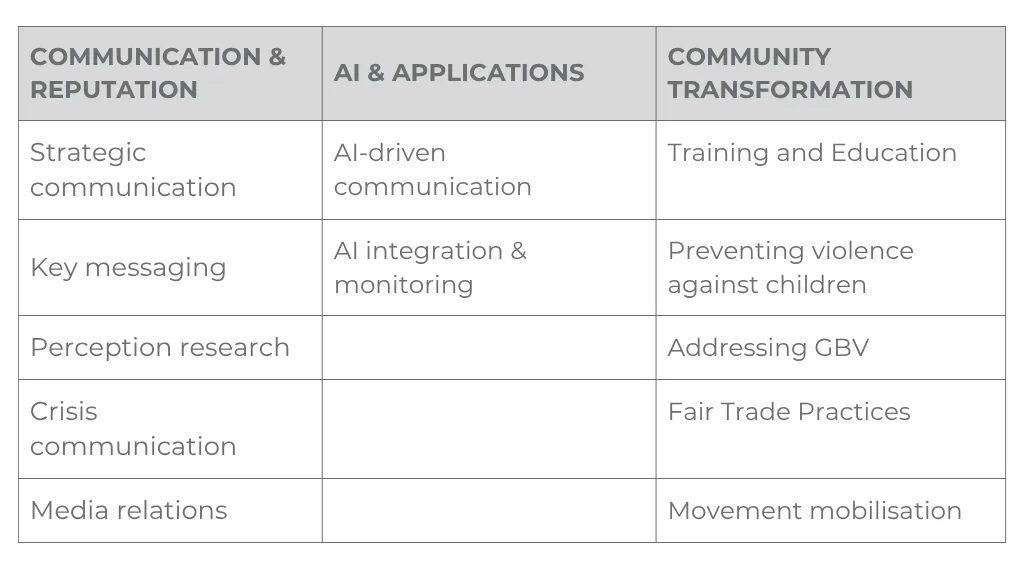
SERVICE DELIVERY PORTFOLIO
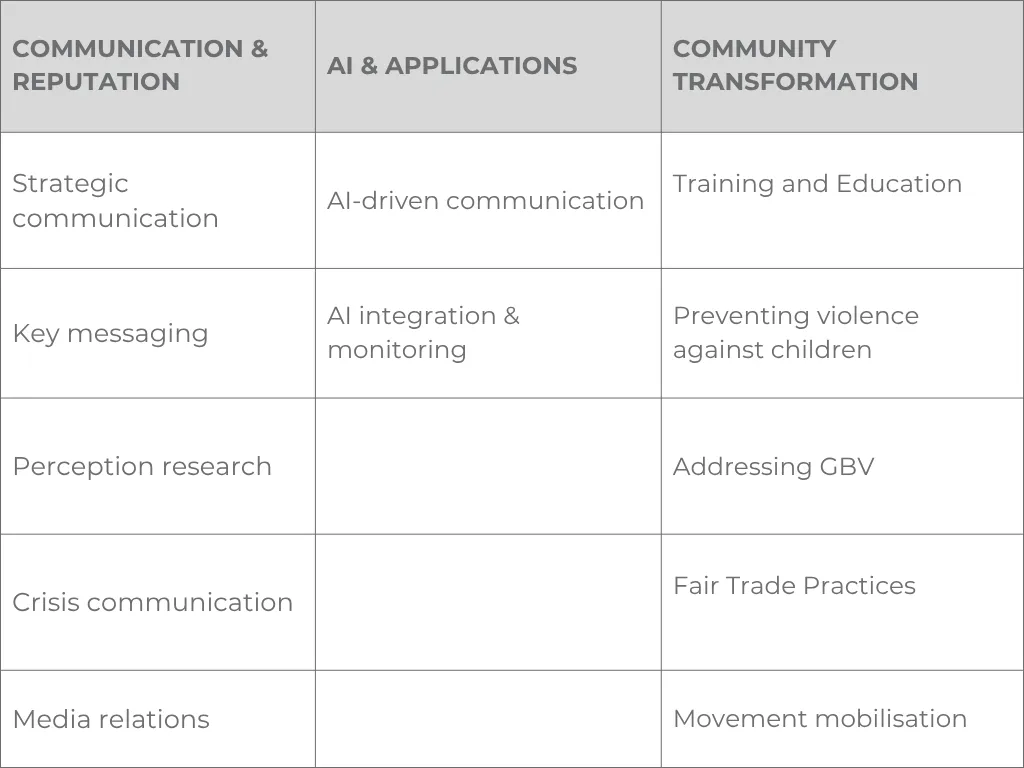
Case studies & ongoing projects
SAP
Structured E-learning site
NATIONAL INSTITUTE FOR THE DEAF
CREATION AND FUNDING FOR THE NID ACADEMY
BELIUM CAMPUS
PIONEERING ICT SECTOR TRAINING
IMC AG
EDUCATING AND TRAINING
INSTITUTE ON JUSTICE FOR CHILD WITNESSES NPC
FUNDRAISING AND AWARENESS CAMPAIGNS
LECO
BRINGING WORLD-CLASS TECHNOLOGY TO WATER RESEARCH
FAIRPLAY
FairPlay celebrates eight years of fighting predatory trade
Case studies & ongoing projects
SAP
Structured E-learning site
NATIONAL INSTITUTE FOR THE DEAF
CREATION AND FUNDING FOR THE NID ACADEMY
BELIUM CAMPUS
PIONEERING ICT SECTOR TRAINING
IMC AG
EDUCATING AND TRAINING
INSTITUTE ON JUSTICE FOR CHILD WITNESSES NPC
FUNDRASING AND AWARENESS CAMPAIGNS
LECO
BRINGING WORLD-CLASS TECHNOLOGY TO WATER RESEARCH
FAIRPLAY
FairPlay celebrates eight years of fighting predatory trade
Alliance members
We draw on a carefully chosen network of trusted partner consultants and subject-matter experts. To read more about these alliance members, click on the logos below.
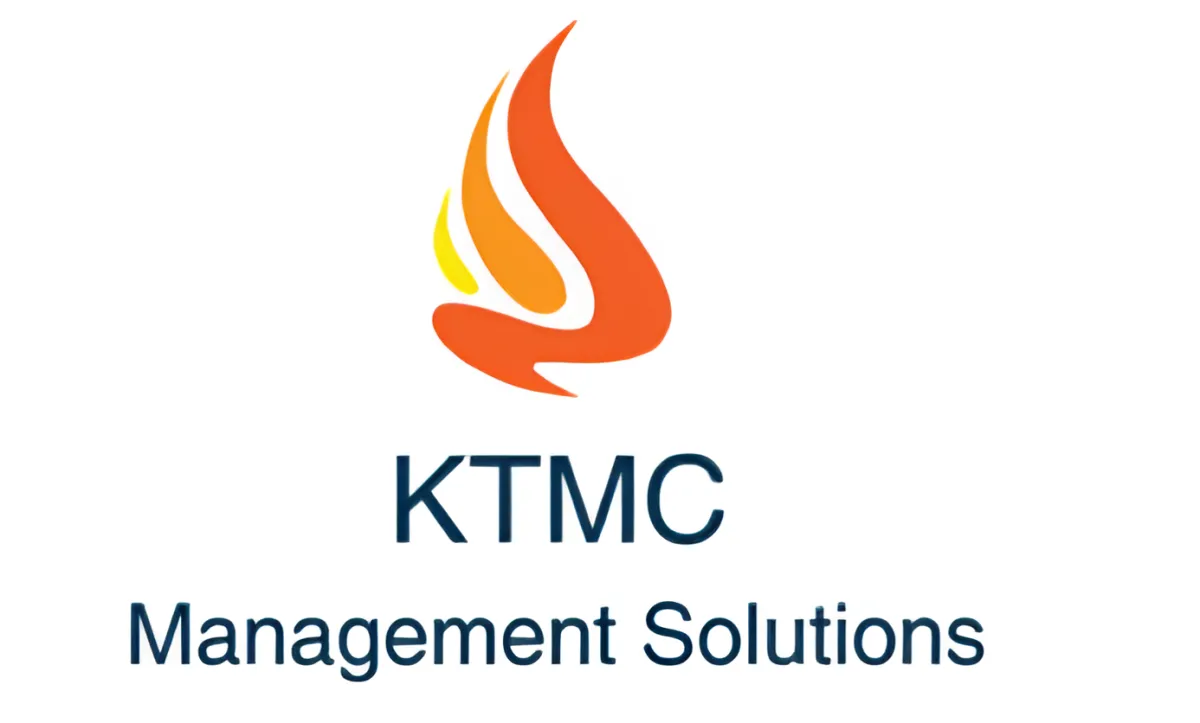




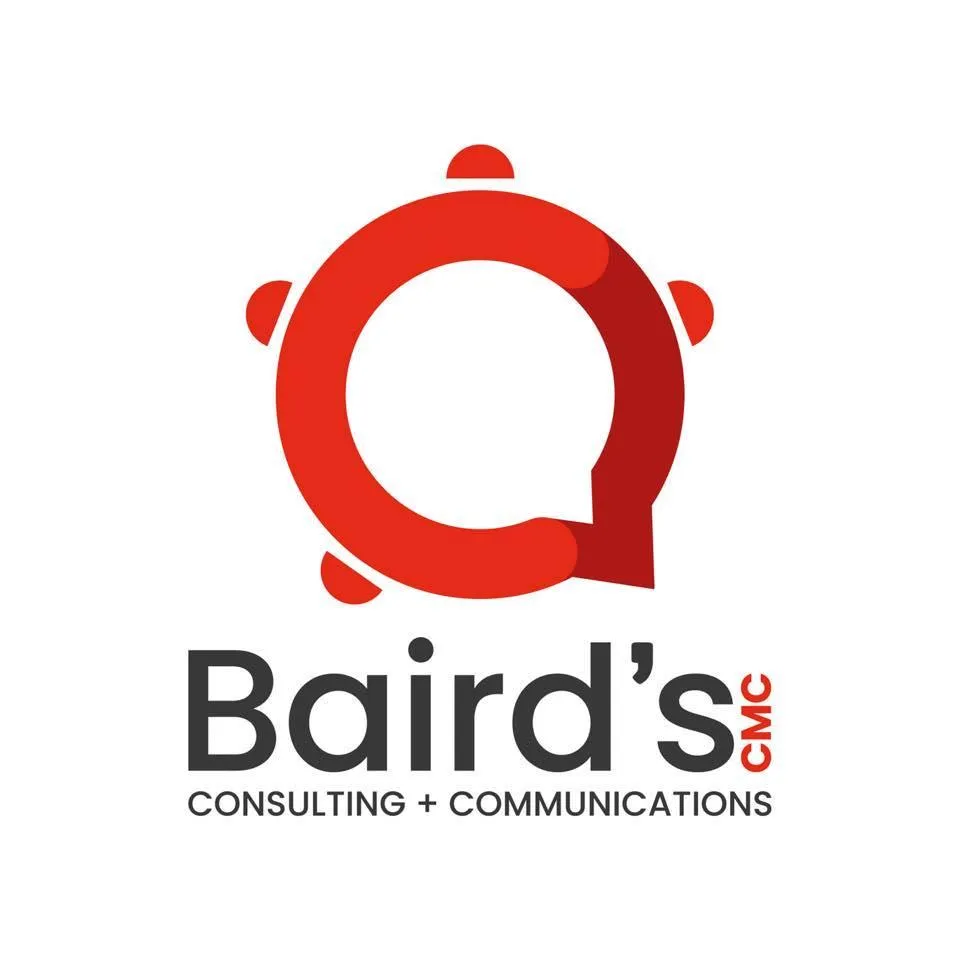
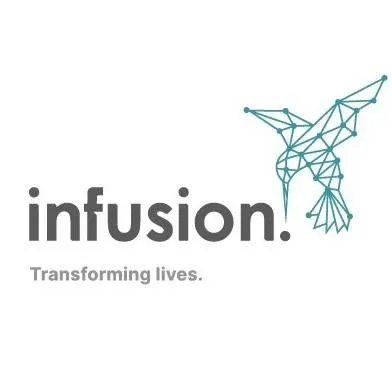


Alliance members
We draw on a carefully chosen network of trusted partner consultants and subject-matter experts. To read more about these alliance members, click on the logos below.









TESTIMONIALS
"Danie taps into his vast network of partnerships to crearte links between the institute and other individuals adn other organisations"
- Karen Hollely, General Manager | Institute for child witness research and training
"stratcona's contribution in coordinating and managing this complex blended-learning project has been invaluable."
- Deon De Villiers, CEO | National Institute for the deaf
"MR KOK IS ABLE TO BRING TOGETHER FUNDERS, VENDORS AND CUSTOMERS TO HELP MaKe RESEARCHERS' DREAMS A REALITY."
- Philip Langenhoven, Managing Director | Leco Africa
"Danie is well-connected on a high level with the corporate world and government, nationally and internationally."
- Enrico M Jacobs, Vice-Chancellor | The Belgium Campus
"Danie was instrumental in developing my leadership, communication, and strategy skills. His coaching and mentorship inspired me to excel."
- Dr Akash Singh, PHD | Research Associate, SAP Research
TESTIMONIALS
"Danie taps into his vast network of partnerships to create links between the institute and other individuals and other organisations"
- Karen Hollely, General Manager | Institute for Child Witness Research and Training
"Stratcona's contribution in coordinating and managing this complex blended-learning project has been invaluable."
- Deon De Villiers, CEO | National Institute for the deaf
"MR KOK IS ABLE TO BRING TOGETHER FUNDERS, VENDORS AND CUSTOMERS TO HELP MaKe RESEARCHERS' DREAMS A REALITY."
- Philip Langenhoven, Managing Director | Leco Africa
"Danie is well connected on a high level with the corporate world and government, nationally and internationally."
- Enrico M Jacobs, Vice-Chancellor | The Belgium Campus
"Danie was instrumental in developing my leadership, communication, and strategy skills. His coaching and mentorship inspired me to excel."
- Dr Akash Singh, PHD | Research Associate, SAP Research
THE STRATEGIC CONVERGENCE ALLIANCE
© 2026 Stratcona - All Rights Reserved
